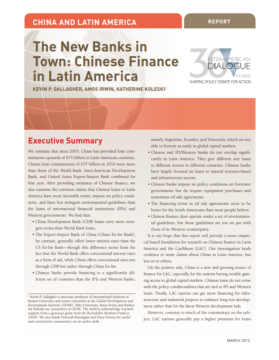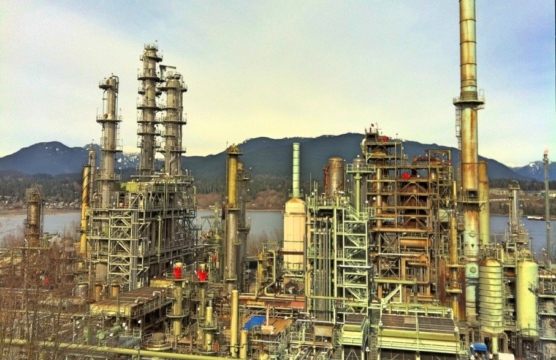
The New Banks in Town: Chinese Finance in Latin America
Estimates of the volume, composition, and characteristics of Chinese lending to the region since 2005.
Santiago Levy, vice president for sector and knowledge at the Inter-American Development Bank (IDB), and Andrew Powell, principal advisor from the research department of the IDB, presented the IDB’s recently published 2012 macroeconomic report, The World of Forking Paths: Latin America and the Caribbean Facing Global Economic Risks, at the Inter-American Dialogue on April 25.
Levy compared the contemporary world economy to the characteristic works of Jorge Luis Borges. Just as Borges creates multiple stories that interconnect to produce many alternative realities, international economic interconnectedness means that a financial crisis anywhere in the world could have many different implications for Latin America and the Caribbean. Given the region’s strengths and vulnerabilities, the report analyzes what Latin America has learned from past crises and whether it has the tools to face future upheaval.
Developing scenarios that would lead to another financial crisis is not a fictional exercise; the risk of another crisis, as the report notes, is very real. The fragile economic situation in Europe, the deceleration of China, and the uncertainty of commodity prices, among other shocks, could collectively or individually burden Latin American countries to varying degrees or even drag down the region as a whole.
Powell laid out the tools that a typical Latin American country has in place to respond to financial crisis. The region has improved public balance sheets that enable it to implement counter cyclical fiscal policies. The increase in international reserves has also stabilized prices, giving countries the freedom to implement more sophisticated monetary policies.
“Overall, the region has been in much better shape than before the crisis – countries have learned a lot. But not everything is perfect,” warned Levy.
In the event of a financial crisis, the region still has critical vulnerabilities. Its fiscal position, he argued, has deteriorated. “If there was a downturn today, countries are less ready to act with countercyclical fiscal policy measures than they were in 2007, 2008, during the financial crisis.” The region’s dependence on commodity prices and China also cause concern, as do the large capital inflows due to high interest rates.
“The combination of capital inflows that are tilted into portfolio flows and high credit growth, in the past, has been lethal,” Levy noted. “Half of capital inflow episodes have ended in a crisis.”
However, Levy and Powell maintained that there are reasons to be optimistic. Despite the region’s heterogeneity, it has shown considerable resilience in times of recession. Regional average GDP is growing, countries have developed better internal policy tools to address economic volatility, and there are better IMF instruments in place, such as flexible credit lines and precautionary arrangements.
Levy recommended that the region take advantage of the present moment “to increase productivity. The core, unresolved problem is the low productivity growth in the region.” This period of growth presents the perfect opportunity for countries to implement much needed reforms in education, taxation, and the labor market.
Estimates of the volume, composition, and characteristics of Chinese lending to the region since 2005.
Crude oil exports from Latin America to the US have plummeted as oil production in the region has slumped while demand is on the rise.
Development banks should play a great role in ensuring sustainable infrastructure development in Latin America in the coming years.

